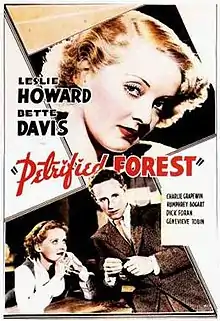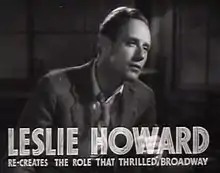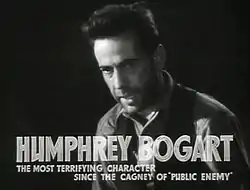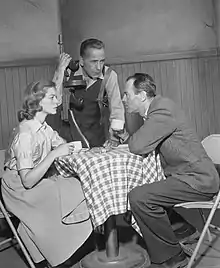The Petrified Forest
The Petrified Forest is a 1936 American film directed by Archie Mayo and based on Robert E. Sherwood's 1935 Broadway drama of the same name. The motion picture stars Leslie Howard, Bette Davis and Humphrey Bogart.[1] The screenplay was written by Delmer Daves and Charles Kenyon, and adaptations were later performed on radio and television. The film is set in Petrified Forest National Park in Arizona.
| The Petrified Forest | |
|---|---|
 Theatrical release poster | |
| Directed by | Archie Mayo |
| Produced by | Hal B. Wallis (executive producer, uncredited) |
| Screenplay by | |
| Based on | The Petrified Forest 1935 play by Robert E. Sherwood |
| Starring | |
| Music by | Bernhard Kaun |
| Cinematography | Sol Polito |
| Edited by | Owen Marks |
Production company | |
Release date | February 6, 1936 (United States) |
Running time | 82 minutes |
| Language | English |
Plot

In the midst of the Great Depression, Alan Squier (Howard), a failed British writer, now a disillusioned, penniless drifter, wanders into a somewhat frowzy roadside diner in the remote town of Black Mesa, Arizona, at the edge of the Petrified Forest. The diner is run by Jason Maple (Porter Hall), his daughter Gabrielle (Davis), and Gramp, Jason's father (Charley Grapewin), who regales anyone who will listen with stories of his adventures in the Old West with such characters as Billy the Kid.
Gabrielle's mother, a French war bride who fell in love with Jason when he was a young, handsome American serviceman, left her "dull defeated man" after World War I and moved back to France when Gabrielle was a baby. She now sends poetry to Gabrielle, who dreams of moving to Bourges, where her parents first met, to become an artist. Alan tells his story—how he wrote one novel, then lived in France for eight years with his publisher's wife, trying to write another—and Gabrielle is instantly smitten with him.

Gabrielle shows Alan her paintings—the first time she has shown them to anyone—and reads him a favorite François Villon poem. Boze Hertzlinger (Dick Foran), a beefy diner employee who has wooed Gabrielle in vain, grows jealous of Alan, who decides to leave forthwith. He mooches a ride from wealthy tourists Mr. and Mrs. Chisholm (Paul Harvey and Genevieve Tobin); but after only a few minutes on the road they encounter Duke Mantee (Bogart), a notorious gangster fleeing a massive police pursuit, whose car has broken down. Duke and his gang seize the Chisholms' car and drive to the diner, where Duke has arranged to rendezvous with his girlfriend, Doris, on their way to Mexico. Alan, the Chisholms, and their chauffeur (John Alexander) soon make their way back to the diner as well.
Alan, indifferent to the hostage situation, engages Duke in lively conversation and toasts him as "the last great apostle of rugged individualism." Boze snatches a rifle and gets the drop on Duke, but during a momentary distraction Duke draws his pistol and shoots Boze in the hand, regaining control. Duke learns that Doris has been captured, and has revealed their rendezvous location to the police. As police and federal agents converge on the diner, Duke prepares to flee, announcing that he will take Mr. and Mrs. Chisholm with him.
Inspired by Boze's act of courage, Alan has an inspiration: while Gabrielle is in the back room bandaging Boze's hand, he produces a life insurance policy from his bag and amends it, making Gabrielle the beneficiary. Then he asks Duke to kill him ("It couldn't make any difference to you, Duke ... they can hang you only once ..."), so that Gabrielle can use the insurance money to realize her dream of moving to France. Duke obliges, then leaves with his human shields. Alan dies in Gabrielle's arms, secure in the knowledge that she, unlike the rest, will escape her dead-end existence to pursue her dreams.
Cast
- Leslie Howard as Alan Squier
- Bette Davis as Gabrielle Maple
- Humphrey Bogart as Duke Mantee
- Genevieve Tobin as Mrs. Chisholm
- Dick Foran as Boze Hertzlinger
- Joseph Sawyer as Jackie
- Porter Hall as Jason Maple
- Charley Grapewin as Gramp Maple
- Paul Harvey as Mr. Chisholm
- Adrian Morris as Ruby
- Slim Thompson as Slim
- Eddie Acuff as First Lineman
- Francis J. Scheid as Second Lineman
- John Alexander as Joseph, the chauffeur
- Nina Campana as Paula, the cook
- Arthur Aylesworth as Commander (uncredited)
- Jim Farley as Sheriff (uncredited)
- Gus Leonard as Jim, the Mailman (uncredited)
History

The 1935 Broadway production of The Petrified Forest starred Howard, an established star, and Bogart, an actor in his first leading theatrical role. Sherwood based the Duke Mantee character on John Dillinger, the notorious criminal who in 1933 was named the FBI's first "Public Enemy #1" by J. Edgar Hoover, and in 1934 was ambushed and gunned down in spectacular fashion by FBI agents. Bogart, who won the stage role in part because of his physical resemblance to Dillinger, studied film footage of the gangster and mimicked some of his mannerisms in his portrayal.[2]
For the film, Warner Brothers intended to cast the more bankable Edward G. Robinson as Duke; but Howard, whose contract gave him final script control, informed the studio that he would not appear in the movie version without Bogart as his co-star.[3] Warners eventually agreed with Howard's request, and the film made Bogart a star, and he remained grateful to Howard for the rest of his life. In 1952, Bogart and Lauren Bacall named their daughter Leslie Howard Bogart in honor of Howard, who had been killed in a plane crash when the German air force shot down his BOAC flight from Lisbon to Bristol during World War II.[2]
In 1948, Robinson portrayed a character similar to Duke Mantee—a gangster holding a disparate group of people hostage in a Florida hotel—in Key Largo. That film's hero was played by Bogart. In his penultimate film, The Desperate Hours (1955), Bogart played another gangster holding a suburban family hostage. He described that character as "Duke Mantee grown up."[2]
Radio and television adaptations
The Petrified Forest was performed on CBS's Lux Radio Theater in 1937, with Herbert Marshall, Margaret Sullavan, and Donald Meek in the principal roles;[4] and again on the same program in 1945, with Ronald Colman, Susan Hayward, and Lawrence Tierney.[5][6] Another radio adaptation starring Joan Bennett, Tyrone Power, and Bogart aired on The Screen Guild Theater on January 7, 1940.

In 1955, a live television version was performed as an installment of Producers' Showcase, a weekly dramatic anthology, featuring Bogart (now top-billed) as Mantee, Henry Fonda as Alan, and Lauren Bacall as Gabrielle. Jack Klugman, Richard Jaeckel, and Jack Warden played supporting roles. In the late 1990s, Bacall donated the only known kinescope of the 1955 performance to the Museum Of Television & Radio (now the Paley Center for Media), where it remains archived for viewing in New York City and Los Angeles. It is now in the public domain.
Reception and Legacy
Writing for The Spectator in 1936, Graham Greene gave the film a mildly poor review. Exploring the transition between Mayo's film and the original stage play from Sherwood, Greene found that Sherwood's lofty philosophy suffered from the adaptation and that the film's "drama slackens under the weight" of the playwright's themes which he characterized as "rather half-baked". Greene praises Davis and Howard for their performances but suggests that "life itself, which crept in during the opening scene [...] crept out again, leaving us only with the symbols."[7]
- After the film's release, Friz Freleng made the short-length Merrie Melodies cartoon parody, She Was an Acrobat's Daughter (1937) that portrays a cinema audience watching The Petrified Florist, starring Bette Savis and Lester Coward.[8]
- In 1972, a take-off of the film entitled "The Putrified Forest" was seen as a sketch on The Carol Burnett Show, featuring Steve Lawrence and Paul Sand.[9]
- The Warner Brothers sound stage on which the movie was filmed is currently the home of Conan O'Brien's TBS television program.[10]
- The film is recognized by the American Film Institute in the 2003 AFI's 100 Years...100 Heroes & Villains in which Duke Mantee appears as a Nominated Villain.[11]
- The 2017 album The Petrified Forest by ambient musician Biosphere uses many clips of dialog from the film.
References
- The Petrified Forest page, Internet Broadway Database, undated. Retrieved May 21, 2009.
- Shickel, Richard. Bogie: A Celebration of the Life and Films of Humphrey Bogart. Thomas Dunne, 2006. ISBN 0-312-36629-9.
- Sklar, Robert (1992). City Boys: Cagney, Bogart, Garfield. Princeton University Press, pp. 60–62. ISBN 0-691-04795-2.
-
"Cecil B. Demille @ Classic Move Favorites – Lux Radio Theater episode list". Retrieved February 20, 2009.
"THE PETRIFIED FOREST" 11-22-37 :59:50 Herbert Marshall, Margaret Sullivan, Donald Meek
- "February 2009". WAMU. Archived from the original on February 6, 2009. Retrieved February 20, 2009.
Lux Radio Theater 04/23/45 The Petrified Forest w/Ronald Coleman & Susan Hayward (Lux)(CBS)(54:33)
-
Haendiges, Jerry. "Lux Radio Theater .. episodic log". The Vintage Radio Place. Archived from the original on December 5, 2016. Retrieved February 20, 2009.
THE PETRIFIED FOREST 151 11-22-37 :59:50 Herbert Marshall, Margaret Sullivan, Eduardo Gienille, Donald Meek
- Greene, Graham (July 24, 1936). "The Petrified Forest". The Spectator. (reprinted in: Taylor, John Russel, ed. (1980). The Pleasure Dome. Oxford University Press. pp. 89–90. ISBN 0-19-281286-6.)
- "She Was an Acrobat's Daughter." bcdb.com. Retrieved December 21, 2010.
- Retrieved March 20, 2014.
- Rolling Stone, issue 1117 (November 2010), p. 54.
- "AFI's 100 Years...100 Heroes & Villains Nominees" (PDF). Archived from the original (PDF) on November 4, 2013. Retrieved August 6, 2016.
External links
| Wikimedia Commons has media related to The Petrified Forest (film). |
- The Petrified Forest at IMDb
- The Petrified Forest at AllMovie
- The Petrified Forest at the TCM Movie Database
- The Petrified Forest at the American Film Institute Catalog
- The Petrified Forest at Rotten Tomatoes
- Producers' Showcase: "The Petrified Forest" at IMDb
- Producers' Showcase: "The Petrified Forest" at the Paley Center for Media
- Producers' Showcase: "The Petrified Forest" at the Internet Archive
- The Petrified Forest at Virtual History
Streaming audio
- The Petrified Forest on Lux Radio Theater: November 22, 1937
- The Petrified Forest on Screen Guild Theater: January 7, 1940
- The Petrified Forest on Lux Radio Theater: April 23, 1945
- The Petrified Forest at Best Plays September 20, 1953